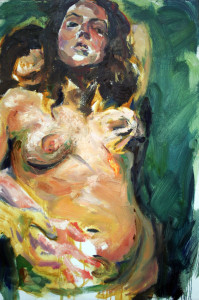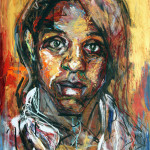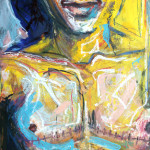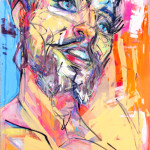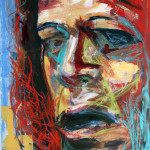Photography by Jessica Hart
Lizz Andronaco is a New York-based painter whose work centers on the topics of identity and queerness in terms of politics, gender, sexuality, and the body.
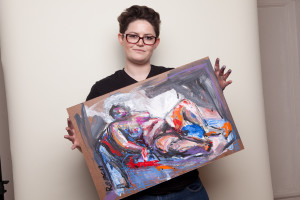
Lizz Andronaco is a 24-year old artist born and raised in the New Jersey suburbs just outside New York City. She completed most of her undergraduate education as a Fine Art major at the University of Delaware, where she developed her skills in painting as well as sculpture, installation, performance and video. Andronaco transferred to Montclair State University in North Jersey, where she finished her undergraduate studies in 2013. Influenced by the art and culture of nearby New York, Andronaco spent her final year at Montclair State evolving her style and shaping her artistic voice, producing work that is expressive and visually and conceptually powerful.
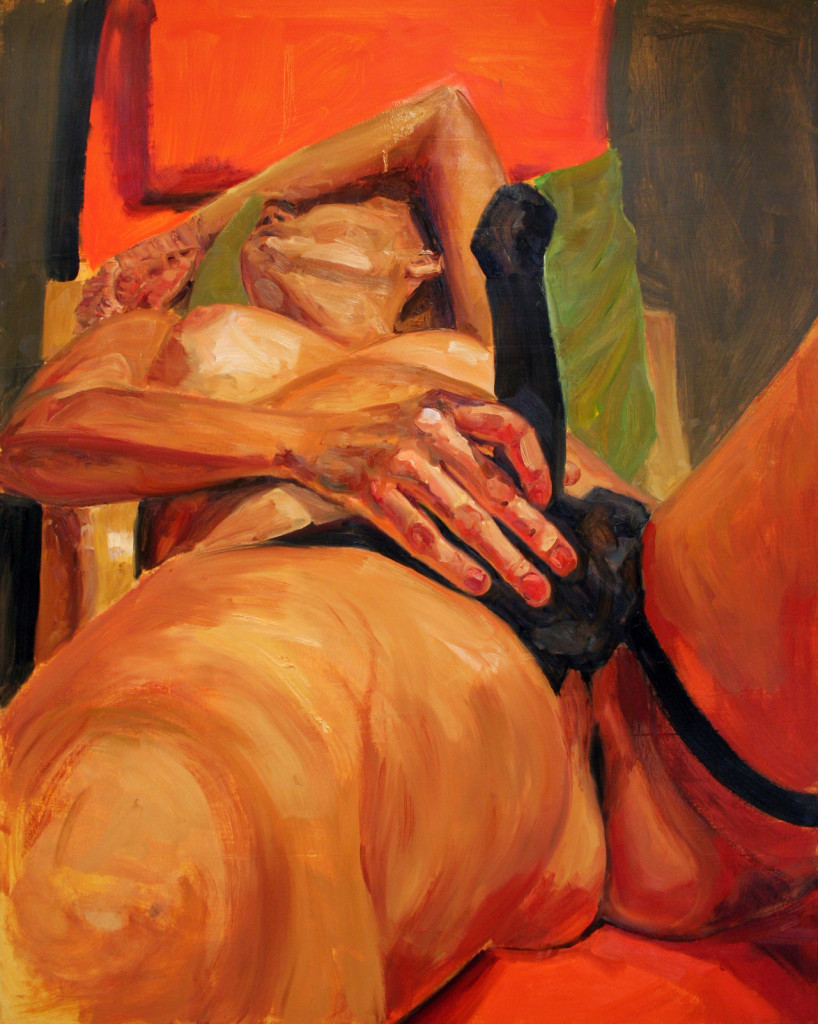
When asked what influences her work, Andronaco tells Posture that she draws much of her inspiration from art history, religion, politics and pop culture, along with elements of her own life, to create provocative images that challenge normative assumptions of gender and sexuality. Andronaco’s Venus series, for instance, references the wide recurrence of the Roman goddess of love and beauty throughout the history of Western art, and how this motif has evolved into the symbolic Venus that drives our beauty industry today. From the Renaissance to the Neoclassical period epitomized by artists such as Jean-Auguste-Dominique Ingres and Alexandre Cabanel, artists have continually depicted the painted mythological goddess as an idealized, unrealistic and anatomically impossible female figure, simultaneously exalting and stripping the subject of her personhood. This distortion of the female figure is even more prevalent and more extreme today, as the lines between reality and fantasy are blurred due to the psychological “realness” of photography in the age of Photoshop. We are all bombarded with Venus imagery every day so much so that society is desensitized to how we judge and see physical beauty. Andronaco believes that women are now more subject to objectification than ever before.
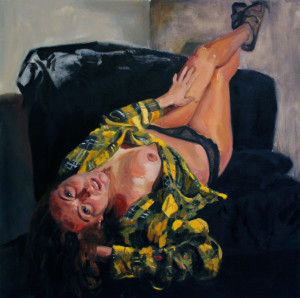
Andronaco’s series Venus also calls evokes the work of Willem de Kooning and Jenny Saville. De Kooning often depicts women in a grotesque way, exaggerating “feminine” parts of the body such as hips, lips, and eyes. Saville’s work similarly shows women in a way that is considered grotesque, but the difference between the two is that De Kooning’s women are impossible constructs of male sexual desire and Saville’s work shows the impacts that society has on female self-image. Several of Saville’s paintings show women who are about to go into plastic surgery (pre and post operation) with the intent of attaining this unnatural constructed beauty. Even though De Kooning and Saville are highly contrasting in theory, Andronaco enjoys both artists because they seek to make the grotesque beautiful in their rich applications of paint. Her portrayals of Venus are made to expand on her own interpretations of the sexual woman as influenced by her personal experience and relationship with her own body.
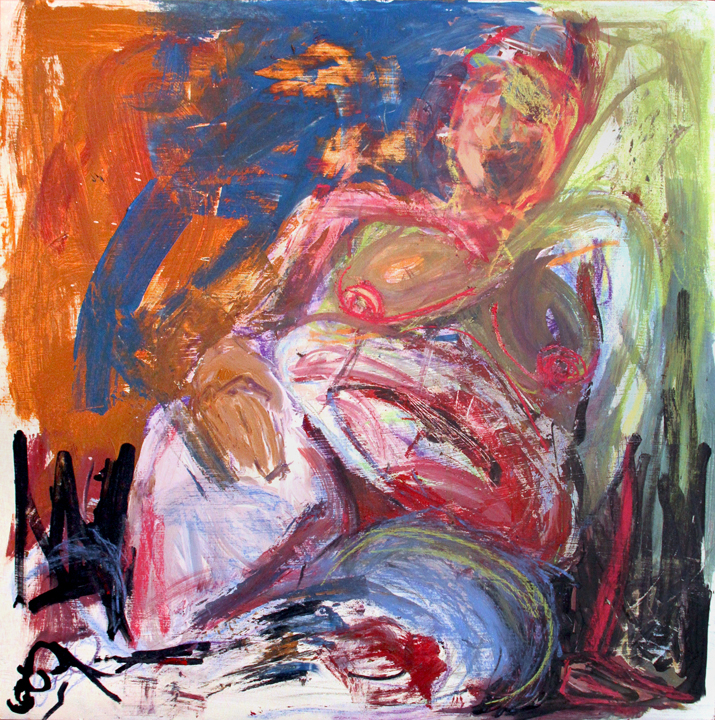
Not only is society overcome with Venus imagery, but also with the constructed hierarchies of race, gender, sexuality, class, physical and mental ability, etc. Even more, there is this societal phenomenon of binary categorization that pits one population over another: white vs. nonwhite, male vs. female, straight vs. gay, cisgender vs. trans*, rich vs. poor, able vs. disabled, etc. These binary identifiers leave no room for those who fall between the cracks. Above all, sex is perhaps the most deeply rooted in this binary. We are defined and categorized by birth and every form we fill out asks for gender specification. For much of society there is a natural path of normativity where everyone is expected to adhere to gender roles throughout our lives (which includes heterosexual activity and procreation). Through Andronaco’s other series, GenderfuQ, she calls on the aesthetics of Catherine Opie and Jean-Michel Basquiat to raises the questions “Why are gender categories so important?” and “Why do they even exist?” This series is a celebration of all those who defy categorization and fall somewhere in between. For these people that fall outside of what is considered normative Andronaco assigns the umbrella term of “queer.” These paintings represent the essence of the complexity and diversity of queer experiences, identities and struggles, with the paintings’ titles being essential to conveying the ideas and emotions behind each piece.
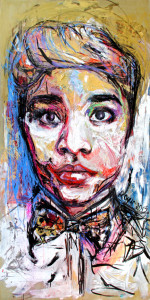
Ultimately Andronaco is interested in exploring the dissonance and chaos that occurs when queerness threatens the boundaries of a rigidly gendered society. She shows that it is not just black or white, but that the spectrum of identity and sexuality is ever-changing, fluid, and broad. She comments, “I want to just be me” and wants everyone to be able to have that power and ability. Andronaco referenced the Self Evident Truths campaign as a huge source of inspiration because they photograph anyone who falls within the LGBTQ spectrum, portraying them as they are in black and white with simple natural lighting. She too takes her figures and shows them in a realistic, textural, and vibrant way which helps the viewer relate to the subject. She hopes that people will never stop questioning the social implications that society is faced with on a daily basis.
Andronaco is not only a productive and passionate artist, but she wants to give back. After years of feeling forced to hide her true identity, one of her future goals is to teach in an after school program to LGBTQ youth in an effort to help the next generation develop a positive self image and find happiness with how they were born or who they want to be.
Stay up-to-date on Lizz’s progress: lizzandroart.tumblr.com and lizzandronaco.com

